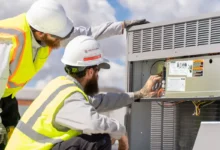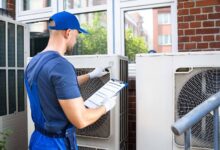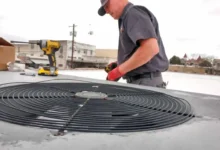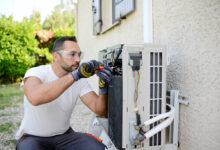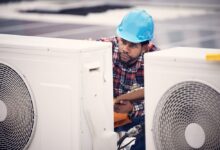HVAC Repair 24 Hour: Profesional 24-Hour HVAC Repair Services
HVAC Repair 24 Hour – Welcome to our comprehensive guide on HVAC repair available 24 hours a day. We understand the frustration that comes with a malfunctioning HVAC system, especially during extreme weather conditions. In this article, we will provide you with a detailed breakdown of everything you need to know about HVAC repair, including common issues, troubleshooting tips, and the importance of 24-hour service. Whether you’re a homeowner or a business owner, this guide will equip you with the knowledge to handle any HVAC emergency.
At the heart of any comfortable indoor space is an efficient and reliable HVAC system. However, even the most well-maintained systems can encounter issues, leaving you in dire need of immediate assistance. It’s crucial to have access to 24-hour HVAC repair services to ensure the comfort and safety of your loved ones or customers. This guide will walk you through the steps to take when your HVAC system breaks down unexpectedly, providing you with the peace of mind that help is just a phone call away.
Understanding HVAC Systems, How HVAC Systems Work
HVAC systems, short for Heating, Ventilation, and Air Conditioning, are designed to control and maintain a comfortable indoor environment. These systems consist of various components that work together to regulate temperature, humidity, and air quality within a space.
The Components of an HVAC System
An HVAC system comprises several essential components, each serving a specific role in the heating, cooling, and ventilation processes. These components include the furnace or heat pump, air conditioner, thermostat, ductwork, and air filters.
Types of HVAC Systems
There are several types of HVAC systems commonly found in residential and commercial settings. These include split systems, packaged systems, ductless mini-split systems, and geothermal systems. Each system has its own advantages and is suited for different applications.
The Importance of Regular Maintenance
Maintaining your HVAC system through regular inspections and servicing is vital to prevent unexpected breakdowns and ensure optimal performance. Regular maintenance activities include cleaning and replacing filters, inspecting and cleaning coils, checking refrigerant levels, and lubricating moving parts.
Common HVAC Issues and Troubleshooting Tips
Air Conditioning Not Cooling
One of the most common HVAC issues is when the air conditioning fails to cool your space adequately. This can be caused by various factors, such as dirty air filters, refrigerant leaks, or a malfunctioning compressor. Troubleshooting tips include checking and replacing filters, cleaning the condenser unit, and ensuring proper airflow.
Heating Not Working
If your HVAC system fails to provide sufficient heat, it can be attributed to issues like a faulty thermostat, a broken ignitor, or a malfunctioning gas valve. Troubleshooting steps include checking thermostat settings, inspecting the ignition system, and ensuring there are no gas supply issues.
Poor Airflow
When you notice weak or uneven airflow from your vents, it can indicate problems with the blower motor or ductwork obstructions. Troubleshooting involves inspecting and cleaning the blower motor, checking for blocked vents, and examining the ductwork for leaks or damage.
Strange Noises
Unusual noises coming from your HVAC system can be a sign of underlying issues. These noises may include grinding, rattling, or squealing sounds. Troubleshooting steps include checking for loose components, lubricating moving parts, and calling a professional technician to diagnose and fix the problem.
Foul Odors
If your HVAC system emits unpleasant odors, it can be caused by mold or bacterial growth, a dead animal in the ductwork, or a malfunctioning component. Troubleshooting involves inspecting and cleaning the ductwork, changing air filters, and scheduling professional maintenance to address any underlying issues.
Thermostat Malfunctions
A malfunctioning thermostat can lead to temperature inconsistencies and system inefficiencies. Troubleshooting steps include checking thermostat settings, replacing batteries if applicable, and recalibrating or replacing the thermostat if necessary.
Leaking HVAC System
A leaking HVAC system can cause water damage to your property and indicate issues such as a clogged condensate drain or a refrigerant leak. Troubleshooting involves locating the source of the leak, clearing clogs, and contacting a professional technician to address refrigerant leaks.
When to Call for Professional Help
Electrical Issues
If you experience electrical problems with your HVAC system, such as blown fuses or tripped breakers, it is crucial to call a professional technician. Electrical issues can be dangerous to handle without the necessary expertise and may require repairs or replacements by a licensed electrician.
Gas Leaks
If you smell gas near your HVAC system or suspect a gas leak, it is essential to evacuate the premises immediately and call your gas utility provider or emergency services. Gas leaks pose a serious safety risk and should only be handled by trained professionals.
Refrigerant Leaks
If you suspect a refrigerant leak in your HVAC system, it’s important to contact a professional technician. Refrigerant leaks can cause system inefficiencies, reduced cooling or heating capacities, and potential environmental harm. A qualified technician can locate and repair the leak, as well as recharge the system with the correct amount of refrigerant.
Major System Failures
In the event of a major system failure, such as a complete breakdown or a malfunctioning compressor or blower motor, it is recommended to call for professional help. Attempting to repair complex issues without proper training and tools can lead to further damage and potentially void warranties.
Unusual Smells or Smoke
If you notice unusual smells, such as burning odors or electrical smells, emanating from your HVAC system, it is crucial to turn off the system immediately and contact a professional technician. These odors can indicate electrical or mechanical issues that require immediate attention to prevent fire hazards or further damage.
Repeated System Cycling
If your HVAC system frequently cycles on and off, known as short cycling, it can indicate issues with components like the thermostat, air filters, or blower motor. Professional assistance is recommended to accurately diagnose and address the underlying cause of the short cycling.
Benefits of 24-Hour HVAC Repair Services
Immediate Assistance During Emergencies
One of the significant benefits of 24-hour HVAC repair services is the ability to receive immediate assistance during emergencies. HVAC breakdowns can occur at any time, and having a trusted service available round the clock ensures that help is just a phone call away.
Greater Convenience and Flexibility
24-hour HVAC repair services provide greater convenience and flexibility for homeowners and businesses. Whether your system fails in the middle of the night or during a holiday, you can rest assured that a professional technician is available to address the issue promptly, minimizing disruption to your daily routine.
Prevention of Further Damage
Timely repair of HVAC systems can prevent further damage and costly repairs. Ignoring a malfunctioning system or delaying repairs can lead to more significant issues, potentially requiring the replacement of costly components or even the entire system. 24-hour services allow for quick intervention, mitigating the risk of extensive damage.
Expertise and Experience
24-hour HVAC repair services employ experienced and knowledgeable technicians who have the expertise to diagnose and fix a wide range of HVAC issues. These professionals undergo extensive training and have access to specialized tools and equipment, ensuring efficient and effective repairs.
Peace of Mind
Knowing that 24-hour HVAC repair services are available provides peace of mind, particularly during extreme weather conditions or when loved ones or customers rely on a comfortable indoor environment. The assurance that help is always accessible can alleviate stress and anxiety associated with unexpected HVAC breakdowns.
Choosing the Right HVAC Repair Company
Certifications and Licenses
When selecting an HVAC repair company, it is essential to consider their certifications and licenses. Look for technicians who are certified by reputable organizations such as NATE (North American Technician Excellence) and licensed by local authorities. These certifications and licenses demonstrate the technicians’ competence and adherence to industry standards.
Experience and Expertise
Experience plays a vital role in determining the competence of an HVAC repair company. Look for companies with a proven track record in the industry, as they are more likely to have encountered a wide range of HVAC issues and can provide effective solutions. Additionally, technicians with specialized expertise in your specific type of HVAC system can ensure optimal repairs and maintenance.
Customer Reviews and Testimonials
Customer reviews and testimonials are valuable sources of information when selecting an HVAC repair company. Read through online reviews on trusted platforms to gauge the company’s reputation, customer satisfaction levels, and the quality of their services. Positive reviews and testimonials indicate a reliable and trustworthy company.
Response Time and Availability
When facing HVAC emergencies, response time is critical. Inquire about the average response timeof the HVAC repair company you are considering. A reputable 24-hour service provider should prioritize quick response times to ensure that your system is restored as soon as possible. Additionally, verify their availability and confirm that they offer round-the-clock service, including weekends and holidays.
Insurance and Warranties
Ensure that the HVAC repair company you choose is fully insured. Insurance protects you from liability in the event of any accidents or damage that may occur during the repair process. Additionally, inquire about warranties on the repairs and parts used. A reliable company will stand behind their work and offer warranties to provide you with peace of mind.
Transparent Pricing and Estimates
Look for an HVAC repair company that provides transparent pricing and detailed estimates. A reputable company should be upfront about their service charges, ensuring there are no hidden fees or surprises. Request a written estimate that includes the cost of parts, labor, and any additional charges, allowing you to make an informed decision.
Professionalism and Customer Service
Professionalism and excellent customer service are key factors to consider when choosing an HVAC repair company. A reliable company will prioritize customer satisfaction, ensuring that their technicians arrive promptly, communicate clearly, and treat you and your property with respect. Look for a company that values open and honest communication and provides exceptional service from start to finish.
DIY Maintenance Tips for Optimal HVAC Performance
Regular Filter Replacement
Regularly replacing your HVAC system’s air filters is one of the simplest yet most effective DIY maintenance tasks. Clogged or dirty filters restrict airflow, reducing system efficiency and potentially causing damage. Check your filters monthly and replace them as needed, or follow the manufacturer’s recommendations.
Cleaning Evaporator and Condenser Coils
Over time, the evaporator and condenser coils of your HVAC system can accumulate dirt and debris, hindering heat transfer and reducing efficiency. Use a soft brush or vacuum cleaner to gently clean the coils, ensuring that they are free from dirt and buildup. Consider scheduling professional coil cleaning for thorough maintenance.
Inspecting and Cleaning Ductwork
Inspecting and cleaning your HVAC system’s ductwork is essential to maintain proper airflow and indoor air quality. Check for any leaks, gaps, or blockages in the ductwork, and seal or repair them as necessary. Additionally, consider scheduling professional duct cleaning every few years to remove dust, allergens, and debris.
Lubricating Moving Parts
Many HVAC systems have moving parts that require regular lubrication to reduce friction and ensure smooth operation. Consult your system’s manual or contact a professional technician to determine which parts require lubrication and the appropriate lubricant to use. Avoid over-lubrication, as this can lead to issues.
Checking and Adjusting Thermostat Settings
Regularly checking and adjusting your thermostat settings can help optimize energy efficiency and comfort. Ensure that the temperature settings are suitable for the time of day and your preferences. Consider utilizing programmable or smart thermostats that allow for automated temperature adjustments based on your schedule.
Clearing Debris Around Outdoor Units
If you have an outdoor HVAC unit, it’s important to keep the surrounding area clear of debris. Remove any leaves, branches, or vegetation that may obstruct airflow or potentially cause damage to the unit. Additionally, ensure that there is adequate clearance around the unit for proper ventilation.
Checking and Sealing Duct Leaks
Duct leaks can significantly impact the efficiency of your HVAC system. Inspect your ductwork for any visible leaks or gaps and seal them using appropriate materials such as foil tape or mastic sealant. Properly sealed ducts ensure that conditioned air reaches its intended destination without escaping through leaks.
Inspecting and Cleaning Vents and Registers
Regularly inspect and clean the vents and registers throughout your home or business to maintain optimal airflow. Remove any dust, dirt, or obstructions that may accumulate over time, ensuring that air can flow freely. This simple maintenance task helps ensure even distribution of conditioned air.
Monitoring Refrigerant Levels
Monitoring the refrigerant levels in your HVAC system is crucial for efficient operation. While checking refrigerant levels is a task best left to professionals, you can still keep an eye out for signs of a potential refrigerant leak, such as reduced cooling or heating performance. If you suspect a leak, contact a professional technician for further inspection and repairs.
Scheduling Professional Maintenance
While DIY maintenance tasks are essential, it’s equally important to schedule regular professional maintenance for your HVAC system. Professional technicians have the expertise and tools to perform thorough inspections, detect potential issues, and ensure optimal performance. Consider scheduling annual or bi-annual maintenance visits to keep your system in top shape.
The Importance of Regular HVAC Inspections
Early Detection of Issues
Regular HVAC inspections allow for early detection of potential issues before they escalate into major problems. Professional technicians can identify signs of wear and tear, leaks, electrical issues, or component failures that may not be immediately evident to the untrained eye.
Optimal Performance and Efficiency
Regular inspections and maintenance help ensure that your HVAC system operates at its peak performance and efficiency levels. Technicians can clean and optimize system components, check refrigerant levels, and calibrate controls to ensure that your system is running as efficiently as possible, reducing energy consumption and utility costs.
Prolonged System Lifespan
Proper maintenance and regular inspections significantly contribute to extending the lifespan of your HVAC system. By addressing minor issues promptly and keeping the system clean and well-maintained, you can avoid premature wear and tear, ultimately maximizing the lifespan of your investment.
Improved Indoor Air Quality
Regular inspections include checking and cleaning various components that impact indoor air quality, such as filters, coils, and ductwork. Clean, well-maintained HVAC systems help remove pollutants, allergens, and contaminants from the air, ensuring a healthier indoor environment for you and your family or employees.
Compliance with Manufacturer Warranties
Many HVAC manufacturers require regular professional maintenance as a condition for warranty coverage. By scheduling regular inspections and maintenance with qualified technicians, you ensure compliance with these requirements, preserving your warranty coverage and potential savings on repairs or replacements.
Upgrading Your HVAC System for Energy Efficiency
Energy Savings
Upgrading to an energy-efficient HVAC system can result in significant energy savings. Newer systems are designed with advanced technologies that enhance efficiency, reducing energy consumption and lowering utility bills. Energy savings can vary depending on the specific system and your region’s energy costs.
Environmental Sustainability
Energy-efficient HVAC systems have a lower environmental impact compared to older, inefficient models. By upgrading to an energy-efficient system, you contribute to reducing greenhouse gas emissions and promoting a more sustainable future. Look for systems with high SEER (Seasonal Energy Efficiency Ratio) ratings for optimal environmental benefits.
Improved Comfort and Performance
Energy-efficient HVAC systems offer improved comfort and performance compared to older models. These systems are designed to provide more precise temperature control, better humidity regulation, and reduced noise levels, enhancing the overall comfort of your indoor space.
Enhanced Features and Technology
Newer HVAC systems come equipped with advanced features and technologies that offer added convenience and control. These may include programmable or smart thermostats, zoning capabilities, and remote access. Upgrading allows you to take advantage of these features, tailoring your HVAC system to your specific needs and preferences.
Potential Incentives and Rebates
When upgrading to an energy-efficient HVAC system, you may be eligible for various incentives and rebates offered by utility companies, government agencies, or manufacturers. These incentives can help offset the initial cost of the upgrade, making it a more affordable investment.
HVAC Maintenance Contracts and Extended Warranties
Prioritized Service
Signing an HVAC maintenance contract ensures that you receive prioritized service when scheduling inspections and repairs. Having a contract in place often means that you will be given priority over non-contract customers, allowing for faster response times during emergencies or peak service periods.
Regularly Scheduled Inspections
HVAC maintenance contracts typically include regularly scheduled inspections, ensuring that your system receives the necessary attention at appropriate intervals. These inspections help identify potential issues early on and allow for prompt repairs or adjustments to maintain optimal system performance.
Discounted Repairs and Parts
Many HVAC maintenance contracts include discounts on repairs and replacement parts. These cost savings can add up over time, especially if your system requires frequent repairs or component replacements. Be sure to review the contract terms to understand the extent of the discounts offered.
Extended Warranties
Some HVAC maintenance contracts include extended warranties for your system. These warranties provide additional protection beyond the manufacturer’s standard warranty, covering specific repairs or replacements for a longer period. Extended warranties offer peace of mind and potential savings on future repairs.
Consistent System Performance
HVACmaintenance contracts help ensure consistent system performance by providing regular inspections and necessary repairs. By staying on top of maintenance tasks, your HVAC system will operate at its best, minimizing the risk of unexpected breakdowns and maximizing energy efficiency.
Reduced Downtime
With an HVAC maintenance contract in place, you can reduce system downtime. Regular inspections and maintenance help identify potential issues before they escalate, allowing for timely repairs that minimize disruptions to your daily routine or business operations.
Peace of Mind
Having an HVAC maintenance contract provides peace of mind, knowing that your system is being regularly monitored and maintained by professionals. This peace of mind extends to the reliability and longevity of your HVAC system, as well as the comfort and safety of your home or business.
Frequently Asked Questions (FAQs) About HVAC Repair
Q: How often should I replace the air filters in my HVAC system?
A: The frequency of air filter replacement depends on factors such as the type of filter, the level of pollutants in your environment, and the manufacturer’s recommendations. As a general guideline, it’s recommended to replace filters every 1-3 months or as needed.
Q: Can I perform HVAC repairs myself?
A: While there are simple maintenance tasks you can perform yourself, such as filter replacement and cleaning, HVAC repairs are best left to trained professionals. Attempting complex repairs without the necessary expertise can lead to further damage or safety hazards.
Q: How long do HVAC systems typically last?
A: The lifespan of an HVAC system can vary depending on factors such as the brand, model, usage, and maintenance. On average, a well-maintained HVAC system can last 15-20 years. Regular maintenance and timely repairs can help extend its lifespan.
Q: How can I improve the energy efficiency of my HVAC system?
A: There are several ways to improve HVAC system efficiency, including upgrading to an energy-efficient model, sealing duct leaks, regularly maintaining and cleaning the system, using programmable thermostats, and ensuring proper insulation in your home or business.
Q: What should I do if my HVAC system is not providing adequate cooling or heating?
A: If your HVAC system is not providing sufficient cooling or heating, you can start by checking and replacing the air filters. It’s also recommended to check the thermostat settings and ensure that there are no obstructions in the vents or registers. If the issue persists, it’s best to contact a professional technician for further diagnosis and repairs.
Q: How often should I schedule professional maintenance for my HVAC system?
A: It’s generally recommended to schedule professional maintenance for your HVAC system at least once a year. However, depending on factors such as usage, system age, and manufacturer recommendations, you may consider scheduling bi-annual maintenance for optimal performance.
Q: Is it necessary to have a 24-hour HVAC repair service?
A: While not every HVAC issue requires immediate attention, having access to 24-hour HVAC repair services can be beneficial during emergencies or situations where system failure can significantly impact comfort or safety. 24-hour services provide peace of mind and ensure that help is available when you need it most.
Q: Can I install a new HVAC system myself?
A: Installing a new HVAC system is a complex task that requires professional expertise. Proper installation is crucial for optimal performance, efficiency, and safety. It’s recommended to hire a licensed HVAC contractor to handle the installation process.
Q: What should I consider when choosing a new HVAC system?
A: When choosing a new HVAC system, consider factors such as the size and layout of your space, energy efficiency ratings, your specific heating and cooling needs, and your budget. Consulting with a qualified HVAC professional can help you select the right system for your requirements.
Q: How can I find a reliable HVAC repair company?
A: To find a reliable HVAC repair company, consider factors such as certifications, experience, customer reviews, response time, availability of 24-hour service, transparent pricing, and professionalism. Asking for recommendations from friends, family, or neighbors can also be helpful in finding a reputable company.
In conclusion, having access to 24-hour HVAC repair services is crucial for maintaining comfort and safety in your home or business. By understanding how HVAC systems work, learning how to troubleshoot common issues, and knowing when to call for professional help, you can ensure the smooth functioning of your system year-round. Remember to choose a reputable HVAC repair company and prioritize regular maintenance to maximize the lifespan and efficiency of your HVAC system. With these insights and tips, you’ll be well-equipped to handle any HVAC emergency that comes your way.
